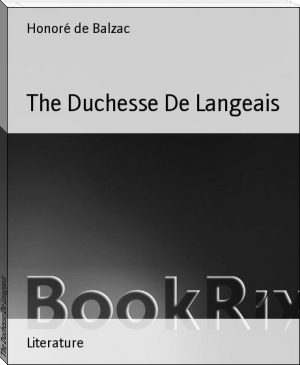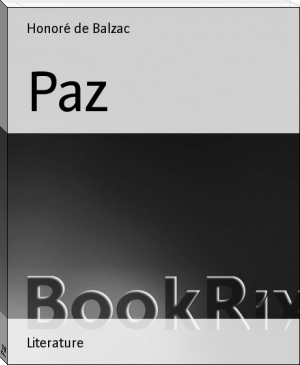The Thirteen by Honoré de Balzac (book club books .txt) 📖

- Author: Honoré de Balzac
Book online «The Thirteen by Honoré de Balzac (book club books .txt) 📖». Author Honoré de Balzac
When Auguste found himself face to face with his antagonist, a man of pleasure, to whom no one could possibly deny sentiments of the highest honor, he felt it was impossible to believe him the instrument of Ferragus, chief of the Devorants; and yet he was compelled, as it were, by an inexplicable presentiment, to question the marquis.
"Messieurs," he said to the seconds, "I certainly do not refuse to meet the fire of Monsieur de Ronquerolles; but before doing so, I here declare that I was to blame, and I offer him whatever excuses he may desire, and publicly if he wishes it; because when the matter concerns a woman, nothing, I think, can degrade a man of honor. I therefore appeal to his generosity and good sense; is there not something rather silly in fighting without a cause?"
Monsieur de Ronquerolles would not allow of this way of ending the affair, and then the baron, his suspicions revived, walked up to him.
"Well, then! Monsieur le marquis," he said, "pledge me, in presence of these gentlemen, your word as a gentleman that you have no other reason for vengeance than that you have chosen to put forward."
"Monsieur, that is a question you have no right to ask."
So saying, Monsieur de Ronquerolles took his place. It was agreed, in advance, that the adversaries were to be satisfied with one exchange of shots. Monsieur de Ronquerolles, in spite of the great distance determined by the seconds, which seemed to make the death of either party problematical, if not impossible, brought down the baron. The ball went through the latter's body just below the heart, but fortunately without doing vital injury.
"You aimed too well, monsieur," said the baron, "to be avenging only a paltry quarrel."
And he fainted. Monsieur de Ronquerolles, who believed him to be a dead man, smiled sardonically as he heard those words.
After a fortnight, during which time the dowager and the vidame gave him those cares of old age the secret of which is in the hands of long experience only, the baron began to return to life. But one morning his grandmother dealt him a crushing blow, by revealing anxieties to which, in her last days, she was now subjected. She showed him a letter signed F, in which the history of her grandson's secret espionage was recounted step by step. The letter accused Monsieur de Maulincour of actions that were unworthy of a man of honor. He had, it said, placed an old woman at the stand of hackney-coaches in the rue de Menars; an old spy, who pretended to sell water from her cask to the coachmen, but who was really there to watch the actions of Madame Jules Desmarets. He had spied upon the daily life of a most inoffensive man, in order to detect his secrets,--secrets on which depended the lives of three persons. He had brought upon himself a relentless struggle, in which, although he had escaped with life three times, he must inevitably succumb, because his death had been sworn and would be compassed if all human means were employed upon it. Monsieur de Maulincour could no longer escape his fate by even promising to respect the mysterious life of these three persons, because it was impossible to believe the word of a gentleman who had fallen to the level of a police-spy; and for what reason? Merely to trouble the respectable life of an innocent woman and a harmless old man.
The letter itself was nothing to Auguste in comparison to the tender reproaches of his grandmother. To lack respect to a woman! to spy upon her actions without a right to do so! Ought a man ever to spy upon a woman whom he loved?--in short, she poured out a torrent of those excellent reasons which prove nothing; and they put the young baron, for the first time in his life, into one of those great human furies in which are born, and from which issue the most vital actions of a man's life.
"Since it is war to the knife," he said in conclusion, "I shall kill my enemy by any means that I can lay hold of."
The vidame went immediately, at Auguste's request, to the chief of the private police of Paris, and without bringing Madame Jules' name or person into the narrative, although they were really the gist of it, he made the official aware of the fears of the family of Maulincour about this mysterious person who was bold enough to swear the death of an officer of the Guards, in defiance of the law and the police. The chief pushed up his green spectacles in amazement, blew his nose several times, and offered snuff to the vidame, who, to save his dignity, pretended not to use tobacco, although his own nose was discolored with it. Then the chief took notes and promised, Vidocq and his spies aiding, to send in a report within a few days to the Maulincour family, assuring them meantime that there were no secrets for the police of Paris.
A few days after this the police official called to see the vidame at the Hotel de Maulincour, where he found the young baron quite recovered from his last wound. He gave them in bureaucratic style his thanks for the indications they had afforded him, and told them that Bourignard was a convict, condemned to twenty years' hard labor, who had miraculously escaped from a gang which was being transported from Bicetre to Toulon. For thirteen years the police had been endeavoring to recapture him, knowing that he had boldly returned to Paris; but so far this convict had escaped the most active search, although he was known to be mixed up in many nefarious deeds. However, the man, whose life was full of very curious incidents, would certainly be captured now in one or other of his several domiciles and delivered up to justice. The bureaucrat ended his report by saying to Monsieur de Maulincour that if he attached enough importance to the matter to wish to witness the capture of Bourignard, he might come the next day at eight in the morning to a house in the rue Sainte-Foi, of which he gave him the number. Monsieur de Maulincour excused himself from going personally in search of certainty,--trusting, with the sacred respect inspired by the police of Paris, in the capability of the authorities.
Three days later, hearing nothing, and seeing nothing in the newspapers about the projected arrest, which was certainly of enough importance to have furnished an article, Monsieur de Maulincour was beginning to feel anxieties which were presently allayed by the following letter:--
Monsieur le Baron,--I have the honor to announce to you that you
need have no further uneasiness touching the affair in question.
The man named Gratien Bourignard, otherwise called Ferragus, died
yesterday, at his lodgings, rue Joquelet No. 7. The suspicions we
naturally conceived as to the identity of the dead body have been
completely set at rest by the facts. The physician of the
Prefecture of police was despatched by us to assist the physician
of the arrondissement, and the chief of the detective police made
all the necessary verifications to obtain absolute certainty.
Moreover, the character of the persons who signed the certificate
of death, and the affidavits of those who took care of the said
Bourignard in his last illness, among others that of the worthy
vicar of the church of the Bonne-Nouvelle (to whom he made his
last confession, for he died a Christian), do not permit us to
entertain any sort of doubt.
Accept, Monsieur le baron, etc., etc.
Monsieur de Maulincour, the dowager, and the vidame breathed again with joy unspeakable. The good old woman kissed her grandson leaving a tear upon his cheek, and went away to thank God in prayer. The dear soul, who was making a novena for Auguste's safety, believed her prayers were answered.
"Well," said the vidame, "now you had better show yourself at the ball you were speaking of. I oppose no further objections."
CHAPTER III. THE WIFE ACCUSED
Monsieur de Maulincour was all the more anxious to go to this ball because he knew that Madame Jules would be present. The fete was given by the Prefect of the Seine, in whose salons the two social worlds of Paris met as on neutral ground. Auguste passed through the rooms without finding the woman who now exercised so mighty an influence on his fate. He entered an empty boudoir where card-tables were placed awaiting players; and sitting down on a divan he gave himself up to the most contradictory thoughts about her. A man presently took the young officer by the arm, and looking up the baron was stupefied to behold the pauper of the rue Coquilliere, the Ferragus of Ida, the lodger in the rue Soly, the Bourignard of Justin, the convict of the police, and the dead man of the day before.
"Monsieur, not a sound, not a word," said Bourignard, whose voice he recognized. The man was elegantly dressed; he wore the order of the Golden-Fleece, and a medal on his coat. "Monsieur," he continued, and his voice was sibilant like that of a hyena, "you increase my efforts against you by having recourse to the police. You will perish, monsieur; it has now become necessary. Do you love Madame Jules? Are you beloved by her? By what right do you trouble her peaceful life, and blacken her virtue?"
Some one entered the card-room. Ferragus rose to go.
"Do you know this man?" asked Monsieur de Maulincour of the new-comer, seizing Ferragus by the collar. But Ferragus quickly disengaged himself, took Monsieur de Maulincour by the hair, and shook his head rapidly.
"Must you have lead in it to make it steady?" he said.
"I do not know him personally," replied Henri de Marsay, the spectator of this scene, "but I know that he is Monsieur de Funcal, a rich Portuguese."
Monsieur de Funcal had disappeared. The baron followed but without being able to overtake him until he reached the peristyle, where he saw Ferragus, who looked at him with a jeering laugh from a brilliant equipage which was driven away at high speed.
"Monsieur," said Auguste, re-entering the salon and addressing de Marsay, whom he knew, "I entreat you to tell me where Monsieur de Funcal lives."
"I do not know; but some one here can no doubt tell you."
The baron, having questioned the prefect, ascertained that the Comte de Funcal lived at the Portuguese embassy. At this moment, while he still felt the icy fingers of that strange man in his hair, he saw Madame Jules in all her dazzling beauty, fresh, gracious, artless, resplendent with the sanctity of womanhood which had won his love. This creature, now infernal to him, excited no emotion in his soul but that of hatred; and this hatred shone in a savage, terrible look from his eyes. He watched for a moment when he could speak to her unheard, and then he said:--
"Madame, your _bravi_ have missed me three times."
"What do you mean, monsieur?" she said, flushing. "I know that you have had several unfortunate accidents lately, which I have greatly regretted; but how could I have had anything to do with them?"
"You knew that _bravi_ were
 Have you ever thought about what fiction is? Probably, such a question may seem surprising: and so everything is clear. Every person throughout his life has to repeatedly create the works he needs for specific purposes - statements, autobiographies, dictations - using not gypsum or clay, not musical notes, not paints, but just a word. At the same time, almost every person will be very surprised if he is told that he thereby created a work of fiction, which is very different from visual art, music and sculpture making. However, everyone understands that a student's essay or dictation is fundamentally different from novels, short stories, news that are created by professional writers. In the works of professionals there is the most important difference - excogitation. But, oddly enough, in a school literature course, you don’t realize the full power of fiction. So using our website in your free time discover fiction for yourself.
Have you ever thought about what fiction is? Probably, such a question may seem surprising: and so everything is clear. Every person throughout his life has to repeatedly create the works he needs for specific purposes - statements, autobiographies, dictations - using not gypsum or clay, not musical notes, not paints, but just a word. At the same time, almost every person will be very surprised if he is told that he thereby created a work of fiction, which is very different from visual art, music and sculpture making. However, everyone understands that a student's essay or dictation is fundamentally different from novels, short stories, news that are created by professional writers. In the works of professionals there is the most important difference - excogitation. But, oddly enough, in a school literature course, you don’t realize the full power of fiction. So using our website in your free time discover fiction for yourself. 




Comments (0)